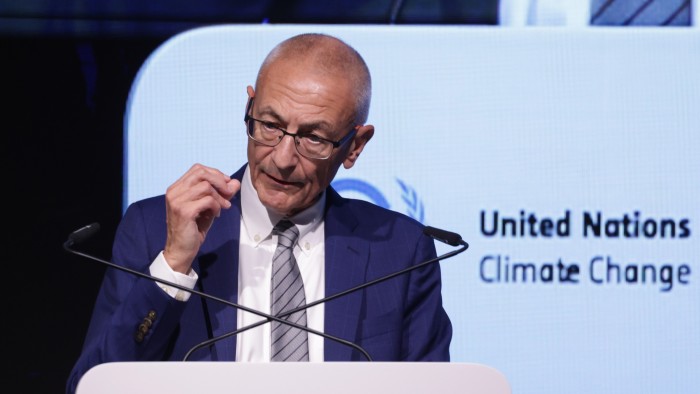Unlock the White House Watch newsletter for free
Your guide to what the 2024 US election means for Washington and the world
President Joe Biden’s top climate adviser conceded action to limit global warming “may be put on the back burner” after Donald Trump’s return to the White House, but sought to reassure the world that this could “slow, not stop” the shift away from fossil fuels.
John Podesta said “we should believe” Trump when he said he would “reverse much of [the] progress” the US had made on tackling climate change, on the opening day of the UN COP29 climate summit in Baku.
“Are we facing new headwinds? Absolutely. But we won’t revert back to the energy system of the 1950s. No way,” said Podesta, speaking for the first time since the US presidential election.
His remarks come as Trump threatens to again remove the US from the UN Paris Agreement and overhaul Biden-era rules to curb emissions.
“It is clear that the next administration will try to take a U-turn and reverse much of this progress,” he said, adding that the fight for climate action by others in the US would continue.
A veteran of the Bill Clinton and Barack Obama administrations, Podesta said the outcome of the election was “bitterly disappointing” for those concerned about climate change. He was “keenly aware” that the US had been an inconsistent partner at global climate talks.
But he believed the stance would be “more difficult to tolerate” as the impact of climate change became ever “more catastrophic”, he said, noting the hottest day ever recorded fell on July 22 and coincided with a series of extreme weather disasters this year.
“None of this is a hoax. It is real. It’s a matter of life and death,” Podesta said.
The US’s near-$370bn in green energy subsidies would also endure, he said. “Many Republicans, especially governors, know all this activity is a good thing for their districts, states and for their economies.”
During the election campaign, Trump signalled support for unrestrained oil and gas expansion, with a promise to “drill, baby, drill”.
An exit from the Paris Agreement would mean the world’s largest polluter historically would abandon its emissions reduction goals at the moment when scientists warn the world is on course for “catastrophic” warming of more than 3C above pre-industrial times.
The US would also be unlikely to boost financial aid to developing countries, a key concern for negotiators during talks in Baku over who should pay to help the world’s poorest countries tackle climate change.
Tina Stege, climate envoy for the Marshall Islands, which are under threat from sea rise, rejected the conclusion that the climate negotiations would be undermined by the US election result. “The Paris Agreement has survived one Trump presidency and it will survive another,” she said.
But she also criticised the absence of several world leaders at the summit, including EU President Ursula von der Leyen and French President Emmanuel Macron, saying it “signals a troubling lack of prioritisation”.
In what would be the first symbolic negotiating breakthrough, the COP29 presidency pushed on Monday for countries to adopt rules on a global market for trading instruments representing carbon emissions.
This will allow for UN oversight of the emissions reductions covered by the credits, which would represent one tonne of carbon dioxide removed or saved from the atmosphere.
Azerbaijan has endorsed rules proposed by a UN expert body last month, suggesting negotiators adopt these without further detailed discussion. Fitri Wulandri, an analyst at carbon data provider Veyt, said that if the draft text it had proposed were adopted, it would be a “rare bright spot of co-operation and progress emerging from COP29”.
Other experts and activists said this hasty approach bypassed proper scrutiny of the rules and could undermine trust in the decision-making process at the heart of annual climate summits. “Kicking off COP29 with a backdoor deal . . . sets a poor precedent for transparency and proper governance,” said Isa Mulder, of the non-profit Carbon Market Watch.
Read the full article here




